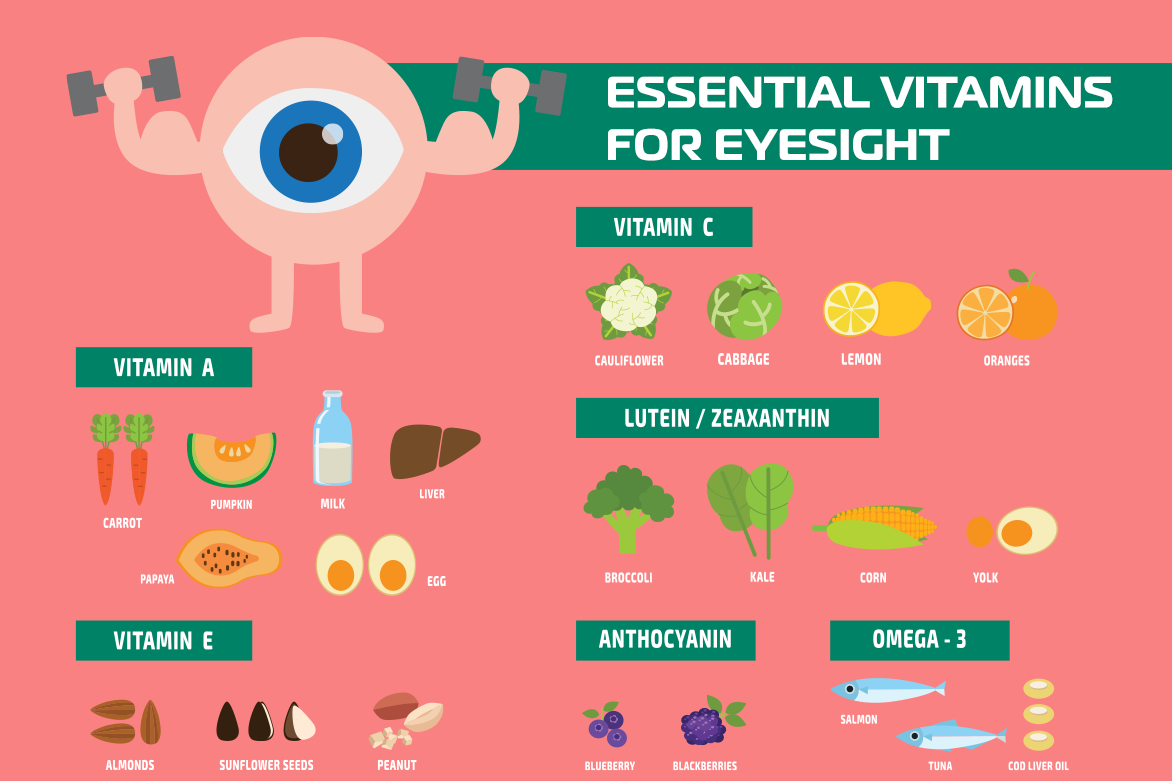Best Foods for Eye Health
Knowing how important the role of our eyes is in our day to day functioning, we tend to neglect the day to day care necessary to maintain optimal eye health.
While we know that eye issues can be a result of eyestrain or aging, most people ignore the fact that an unbalanced diet, as well as deficiency in certain nutrients, can also facilitate eye issues. This implies that eating healthy means that there are certain nutrients that can help reduce the risk of eye issues. Some of these nutrients include omega-3 fatty acids, lutein, copper, zeaxanthin, zinc, vitamin E, A, C, and beta-carotene. For healthy eyes, there are foods that should be part of your diet daily. They include:
1. Fish- Fish is very rich in omega-3 fatty acids, especially oily fish which have oil inside their body tissue and guts. They are regarded as the major source of omega-3 fatty acids which help in improving the immune system and brain function. More so, it helps in the development of the eye and retina and in keeping the eyes from dryness. It is therefore important to incorporate fish into your diet about 3 times a week. Incorporating fish rich with this needed nutrient such as salmon, tuna, sardines, trout, herring, mackerel, and anchovies about 3 times a week is important in helping to maintain optimal eye health.
2. Eggs- The yolk of an egg contains a combination of the nutrients vitamin A, zeaxanthin, and lutein which help to safeguard the cornea, reducing the chances of suffering from cataracts and macular degeneration and zinc which keeps the retina healthy and aids night vision. Eggs are very complimentary food as it can go with other foods and can also take various forms based on your taste.
3. Carrots- This is the most common food for eye health. It contains beta-carotene and vitamin A which protect the surface of the eyes and help to prevent infections. Vitamin A is a form of protein known as rhodopsin and it is tasked with the responsibility of aiding the eyes in absorbing light. A lack of vitamin A is the reason why there are about 500 thousand blind children every year. Carrots are easy to get and very affordable. They can serve as snacks or be sliced or diced into salads.
4. Nuts and Legumes- Legumes and nuts provide a lot of vitamin E and omega-3 fatty acids which guard the eyes against age-related disorders. Brazilian nuts, peanuts, walnuts, lentils, and cashews are perfect examples of legumes and nuts and can be eaten as a form of dessert or taken as snacks based on your choice.
5. Citrus Fruits- Citrus fruits are rich in vitamin C, an essential nutrient for healthy eyes. Vitamin C helps in keeping the blood vessels in the eyes healthy. It also stands against cataracts, and with other nutrients, it helps against macular degeneration. Citrus fruits include oranges, grapefruits, and lemons. The good thing about this food is that they can be consumed on their own or turned into a juice.
6. Green Vegetables- The types of vegetables are very rich in zeaxanthin, lutein and also have a trace of vitamin c. Lutein and zeaxanthin prevent macular degeneration and fights against cataract. These nutrients are not produced in the body and therefore need to be consumed regularly. One of the most instrumental vegetables in keeping a healthy eye is Kale, while other vegetables include spinach, red pepper, and collards.
7. Water- Water is a very important element for the body system to function normally. It also plays an important role in eye health. Water helps against dehydration and as such, it helps against the dryness of the eyes.
Other food that should be incorporated in our diet includes beef, potatoes, seeds, and oysters. Meals that contain nutrients like omega-3 fatty acids, lutein, copper, zeaxanthin, zinc, vitamin E, A, C, and beta-carotene should be incorporated.
There is a large variety of foods that fit all of these categories so keeping your diet interesting is easy… make sure you are eating healthy for your eye’s sake.
Read More



